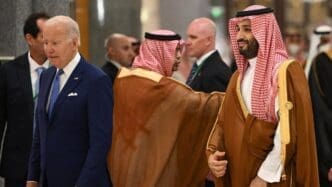Saad Almadi, a 74-year-old retiree from Boca Raton, has reportedly been compelled by Saudi Arabian authorities to relinquish his U.S. citizenship after being detained over tweets critical of the Saudi crown prince. This incident highlights a broader strategy by Saudi Arabia to silence dissent, even from individuals holding dual citizenship with the United States.
Almadi, a dual Saudi-American national, was arrested in 2021 during a visit to Saudi Arabia. He was confronted by Saudi officials with his past social media posts, which included criticism of the Saudi government and comments on the killing of journalist Jamal Khashoggi. These tweets led to his imprisonment on charges linked to terrorism, resulting in a sentence of over 19 years. Although Almadi was released after a year, he remains unable to return to the United States due to an imposed exit ban.
The issue came to light when Almadi’s son reported the situation. He stated that Saudi intelligence operatives forced his father to sign documents to renounce his U.S. citizenship, promising to lift the exit ban if he complied. Almadi attempted to follow these directives, turning his passport over to the U.S. Embassy; however, the State Department maintains that Almadi’s actions have not met the legal requirements for renouncing citizenship, and he still holds his American nationality.
This case is part of a pattern of behavior from the Saudi government, which does not recognize dual citizenship and often suppresses dissent. Other dual citizens have reported similar experiences, but Almadi’s case stands out for its severity. Human rights groups have noted that such acts of coercion aim to quiet criticism and prevent dual nationals from speaking against the Saudi regime.
Almadi’s plight poses a diplomatic challenge for the United States, particularly as it seeks to rebuild relations with Saudi Arabia. This comes after past tensions, notably the fallout from Khashoggi’s murder, which strained ties between the two nations. President Joe Biden initially criticized Saudi leaders and promised accountability, but geopolitical and economic factors have since softened his stance.
The incident also questions the strength of U.S. advocacy for its citizens abroad, as Almadi’s son expressed frustration over what he perceives as inadequate action from the State Department. Despite these diplomatic intricacies, Almadi’s family continues to press for his return to the United States, hoping that international attention will expedite his case.
Saad Almadi’s situation underscores the delicate balance between diplomacy and human rights advocacy, highlighting the challenges faced by dual citizens caught in geopolitical conflicts. As the Almadi family seeks resolution, the case remains a pivotal point in evaluating the United States’ commitment to protecting its citizens and addressing international human rights concerns.
Source: Nbcmiami








